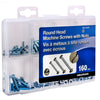If you're in the market for used appliances, you're not alone. Many savvy shoppers are turning to second-hand options to save money and reduce their environmental footprint. However, diving into the world of used appliances requires a bit of knowledge to ensure you're making a wise investment. In this blog post, we'll explore the key things to consider when comparing used appliances so you can make an informed decision.
1. Assess Your Needs
Before you start browsing, take a moment to assess what you truly need. Are you looking for a refrigerator, a washer, or perhaps an oven? Determining your essential requirements helps you to stay focused and avoid getting sidetracked by potential deals that don't actually meet your needs.
2. Check the Appliance's Age
One of the most crucial factors to consider is the appliance's age. Older models might be tempting due to their lower price, but they often lack the energy efficiency and modern features of newer models. As a rule of thumb, aim for appliances that are less than ten years old for a good balance of price and performance.
3. Examine the Condition
When buying used appliances, the condition is king. Take the time to inspect the item thoroughly. Look for visible signs of wear and tear, such as dents or rust. It's also wise to operate the appliance if possible to ensure there are no functional issues. Listen for unusual noises, check for leaking water in washers or dishwashers, and verify that seals and lights work properly.
4. Research the Brand and Model
Some brands and models are known for their longevity and reliability, which can make purchasing used appliances less risky. Research the specific model you're interested in to see if it has any common issues or recalls. Reading reviews and forums can provide additional insights into a model's typical lifespan and performance history.
5. Ask About the Appliance's History
When possible, inquire about the appliance's history. Understanding where the item has been stored and how often it has been used can give you clues about its potential lifespan. Also, ask if there have been any previous repairs. Frequent repairs could indicate an unreliable appliance.
6. Warranty Possibilities
While most used appliances don't come with a warranty, some sellers offer limited return policies or service guarantees. This can be a great safety net, offering peace of mind in case the appliance fails soon after purchase.
7. Check the Energy Efficiency
Even though an appliance may be inexpensive at the outset, its operational costs can add up over time. Check the energy efficiency of the model to estimate its potential impact on your utility bills. An energy-efficient appliance might have a higher initial cost but could save you money in the long run.
8. Compare Pricing
Finally, compare the price of the used appliance against similar options in the market. Ensure you're getting a fair deal by researching what others are paying for the same or similar models. Factor in the condition, age, and features to assess whether you're looking at a good buy.
When done correctly, purchasing used appliances can be a rewarding experience that provides significant savings. By keeping the above considerations in mind, you can confidently navigate the marketplace and find the right appliance for your home.
For more information and resources on finding the best appliances, including both new and used options, visit xpartsupply.com.







